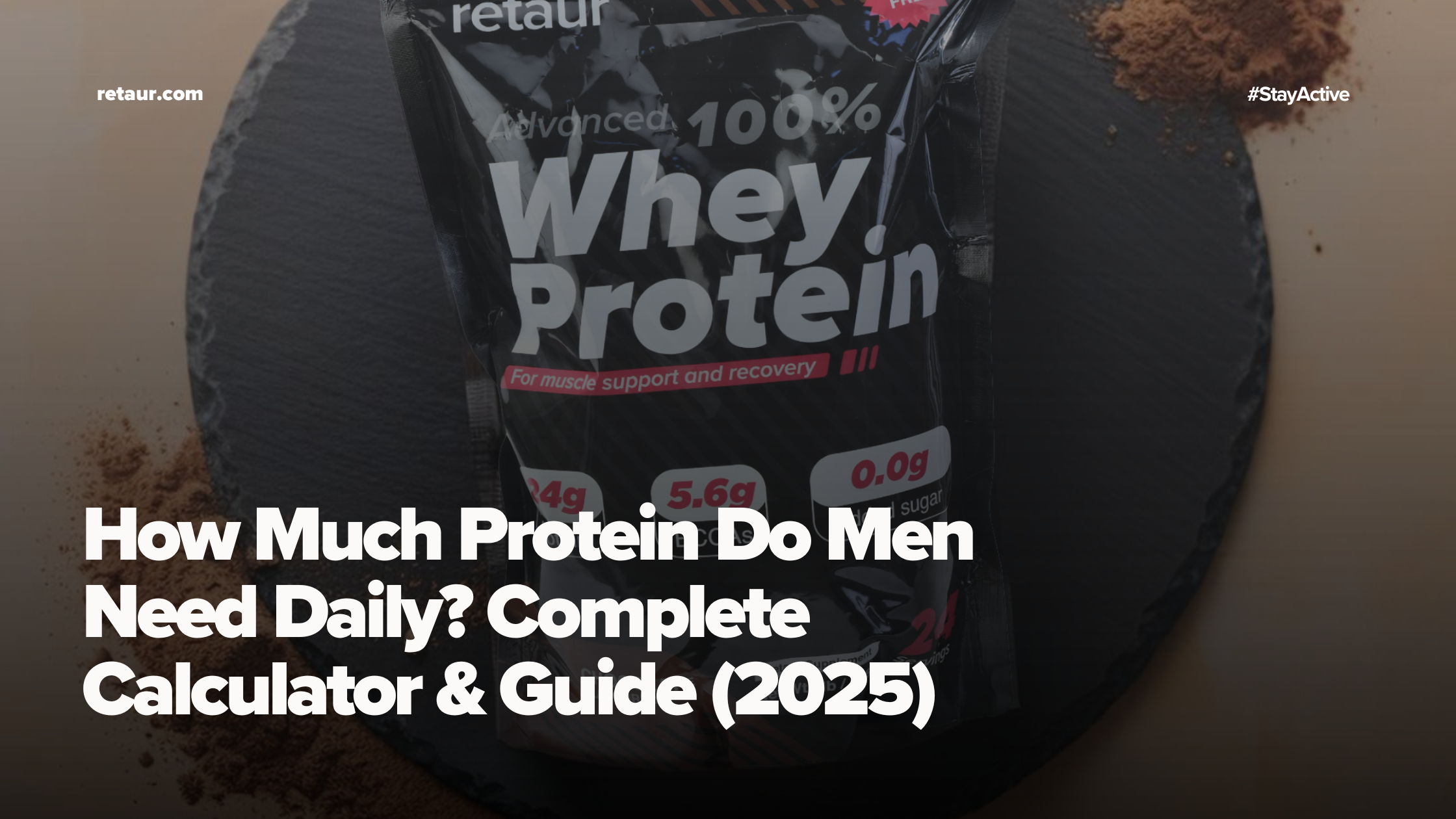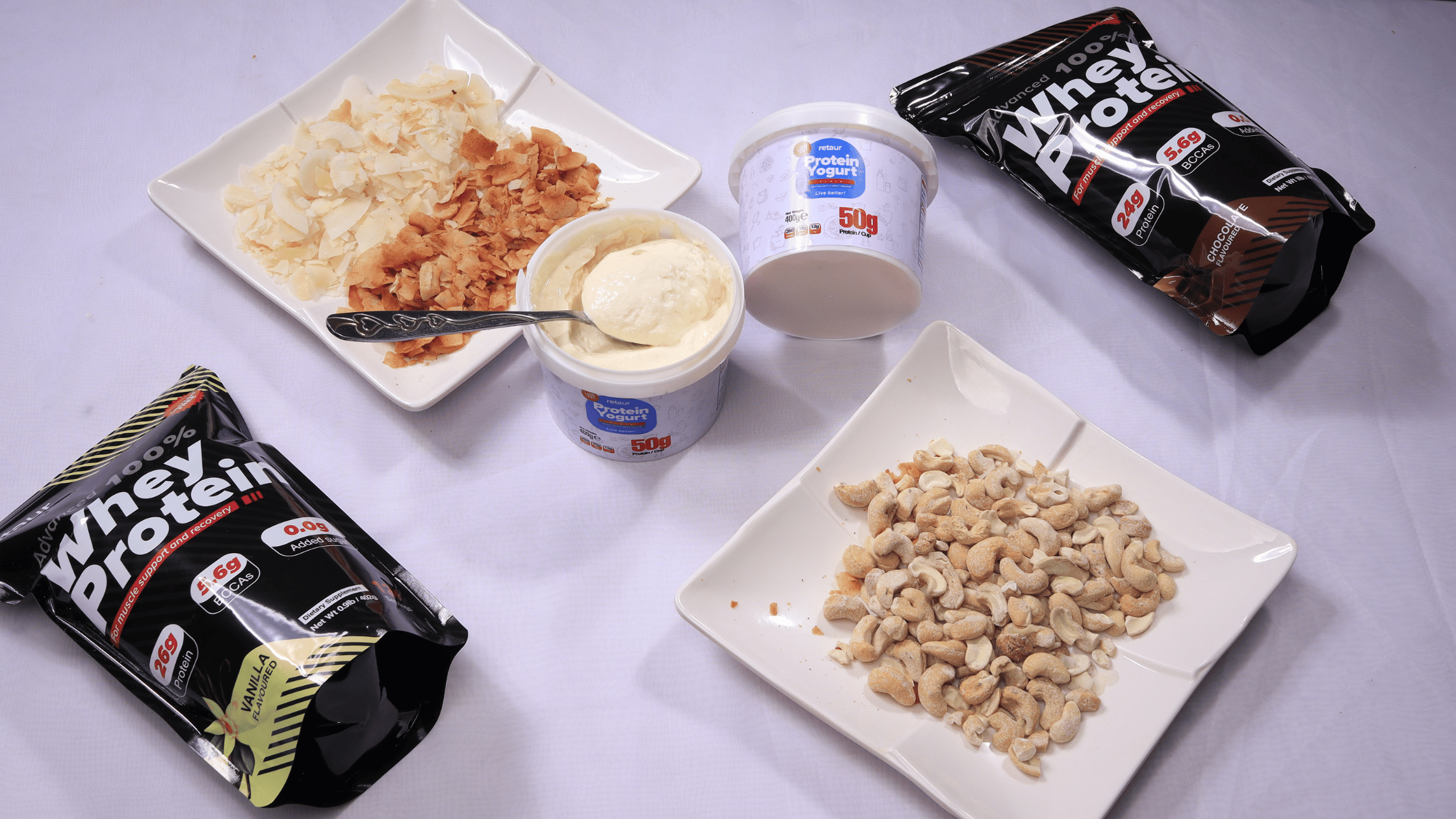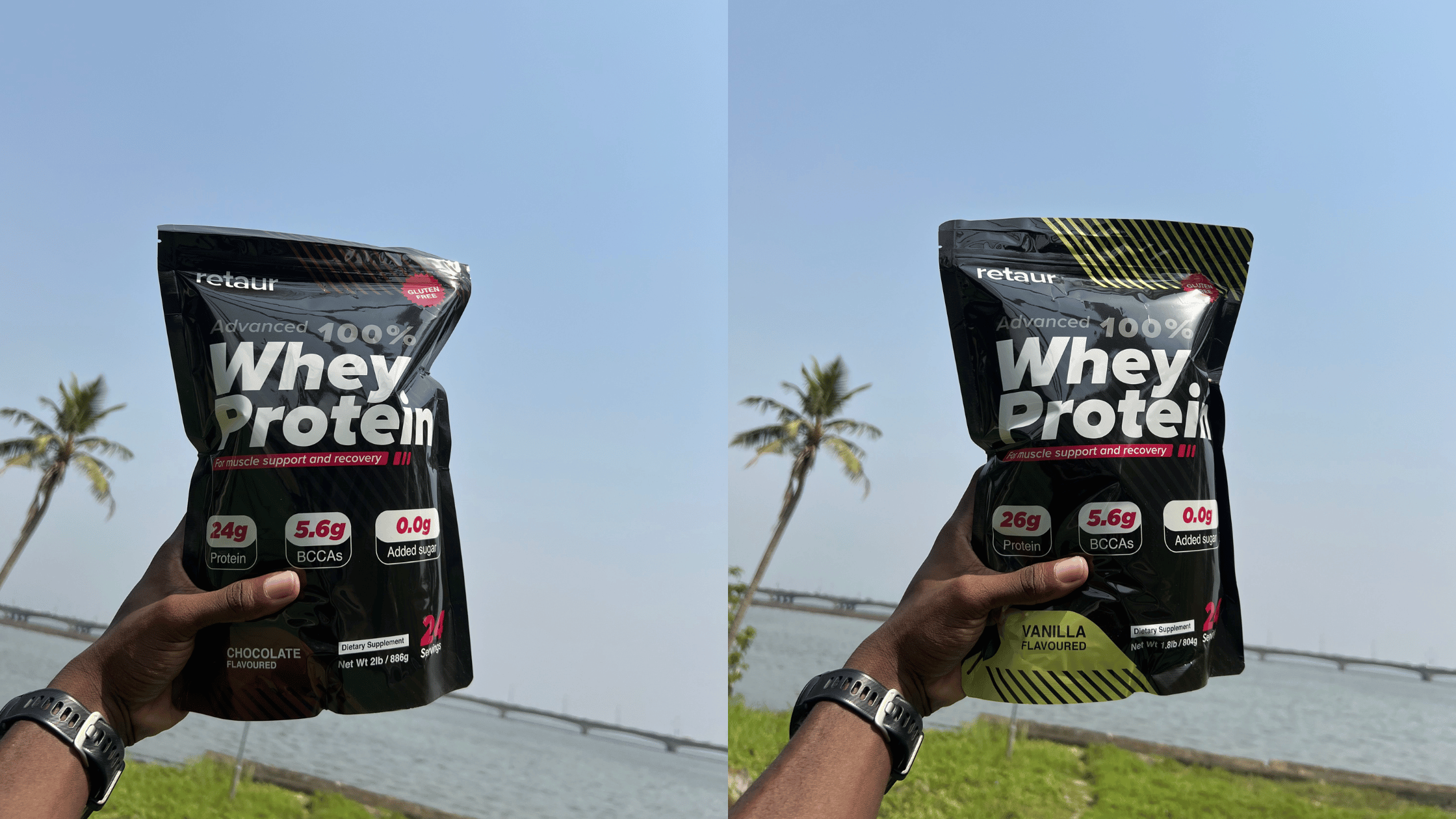How Much Protein Do Men Need Daily? Complete Calculator & Guide (2025)

Quick Answer: Daily Protein Needs for Men
Standard Recommendation: 1.4-2.2g per kg of body weight daily
80kg Nigerian man: 110-175g protein daily
varies by: Age, activity level, fitness goals, and health status
Quick Calculator:
- Sedentary: Body weight (kg) × 1.0g = daily protein
- Active: Body weight (kg) × 1.6g = daily protein
- Muscle Building: Body weight (kg) × 2.0g = daily protein
- Over 40: Add 20% to any calculation above
Complete Protein Calculator for Men
Basic Protein Calculator
Step 1: Enter Your Details
- Current weight: ___kg
- Age: ___years
- Activity level: Sedentary/Moderate/Active/Very Active
- Primary goal: Maintenance/Weight Loss/Muscle Building
Step 2: Calculate Your Needs
Formula Based on Activity:
Activity Level
Sedentary (office job, no exercise)
Lightly Active (1-2 workouts/week)
Moderately Active (3-4 workouts/week)
Very Active (5-6 workouts/week)
Athlete/Bodybuilder (intense daily training)
Protein per kg
1.0-1.2g
1.4-1.6g
1.6-1.8g
1.8-2.0g
2.0-2.4g
Example (80kg man)
80-95g daily
110-130g daily
130-145g daily
145-160g daily
160-190g daily
Step 3: Age Adjustments
Age Group
18-29 years
30-39 years
40-49 years
50+ years
Adjustment
Standard calculation
+10% to result
+20% to result
+25% to result
Reason
Peak muscle building phase
Metabolism begins slowing
Muscle loss accelerates
Combat age-related sarcopenia
Step 4: Goal-Specific Modifications
Weight Loss (Fat Burning):
- Use "Very Active" calculation even if less active
- Higher protein preserves muscle during caloric deficit
- Increases satiety and metabolic rate
Muscle Building (Bulking):
- Use highest range for your activity level
- Consider 2.0-2.4g per kg for maximum growth
- Combine with resistance training program
Maintenance (General Health):
- Use standard calculation for activity level
- Focus on protein quality over quantity
- Consistent daily intake more important than peak amounts
Detailed Protein Requirements by Life Stage
Men in Their 20s: Building Phase
Optimal Range: 1.6-2.2g per kg body weight
70kg man: 110-155g daily
80kg man: 130-175g daily
90kg man: 145-200g daily
Key Factors:
- High testosterone supports maximum protein utilization
- Fastest recovery allows for higher training volumes
- Peak muscle-building potential
- Higher metabolism can handle more calories
Retaur Recommendation:
- 2 scoops Retaur Whey Protein daily (50g protein)
- 1 Retaur Protein Yogurt for convenience (18g protein)
- Remaining 60-100g from whole foods
Men in Their 30s: Optimization Phase
Optimal Range: 1.6-2.0g per kg body weight
70kg man: 110-140g daily
80kg man: 130-160g daily
90kg man: 145-180g daily
Key Factors:
- Metabolism begins slowing (2-4% per decade)
- Work-life balance affects consistency
- Muscle preservation becomes priority
- Recovery time increases
Busy Professional Strategy:
- Morning: Retaur Protein Yogurt with breakfast (18g)
- Post-workout: 30g Retaur Whey Protein (25g)
- Afternoon: 25g Retaur Whey Protein (21g)
- Dinner: Whole food protein (40-50g)
Men in Their 40s: Preservation Phase
Optimal Range: 1.8-2.2g per kg body weight
70kg man: 125-155g daily
80kg man: 145-175g daily
90kg man: 160-200g daily
Key Factors:
- Muscle loss accelerates (8% per decade)
- Testosterone decline affects protein synthesis
- Metabolism significantly slower
- Recovery takes 48-72 hours
Anti-Aging Protocol:
- Higher protein compensates for reduced efficiency
- Focus on leucine-rich sources (whey protein)
- Distribute evenly across meals
- Consider digestive-friendly options like Retaur Protein Yogurt
Men Over 50: Longevity Phase
Optimal Range: 2.0-2.4g per kg body weight
70kg man: 140-170g daily
80kg man: 160-190g daily
90kg man: 180-215g daily
Key Factors:
- Sarcopenia (age-related muscle loss) accelerates
- Protein synthesis significantly reduced
- Digestive efficiency decreases
- Independence and mobility depend on muscle mass
Senior-Optimized Approach:
- Smaller, frequent protein doses (20-25g every 3 hours)
- Easy-to-digest options prioritized
- Focus on complete amino acid profiles
- Include anti-inflammatory sources

Protein Quality Matters: Getting the Most from Your Intake
Complete vs Incomplete Proteins
Complete Proteins (All Essential Amino Acids):
- Retaur Whey Protein: Highest biological value
- Retaur Protein Yogurt: Complete + probiotics
- Eggs: Perfect amino acid profile
- Chicken, fish, beef: High bioavailability
- Milk and dairy: Fast and slow proteins
Incomplete Proteins (Missing Some Amino Acids):
- Rice and beans: Complete when combined
- Nuts and seeds: Good but not complete
- Most plant proteins: Require combining
Biological Value Rankings
Protein Source
Whey Protein (Retaur)
Whole Eggs
Retaur Protein Yogurt
Chicken Breast
Fish
Beef
Plant Proteins
Biological Value
100+
100
95
90
85
80
60-80
Absorption Speed
Very Fast (30 min)
Fast (45 min)
Medium (60 min)
Medium (90 min)
Medium (90 min)
Slow (2-3 hours)
Variable
Leucine Content (Critical for Men)
Leucine Triggers Muscle Protein Synthesis:
- Retaur Whey Protein: 2.5g per 30g serving
- Retaur Protein Yogurt: 1.8g per serving
- Chicken breast: 1.9g per 100g
- Eggs: 1.0g per egg
- Plant proteins: 0.8-1.5g per 30g
Daily Leucine Target: 8-12g from all sources
Practical Protein Distribution Throughout the Day
Optimal Meal Distribution
Research Shows: 25-40g protein per meal maximizes muscle protein synthesis
4-Meal Schedule (Recommended):
- Breakfast: 25-30g protein
- Lunch: 35-40g protein
- Post-Workout: 30-40g protein
- Dinner: 30-35g protein
5-Meal Schedule (Advanced):
- Breakfast: 25g protein
- Mid-Morning: 20g protein
- Lunch: 30g protein
- Post-Workout: 35g protein
- Dinner: 25g protein
Sample Daily Protein Plans
130g Daily Target (80kg moderately active man):
Option A: Retaur-Focused
- 7 AM: Retaur Protein Yogurt + granola (18g)
- 12 PM: Chicken rice bowl (35g)
- 3 PM: 25g Retaur Whey Protein shake (21g)
- 6 PM Post-Workout: 35g Retaur Whey Protein (30g)
- 8 PM: Fish and vegetables (26g)
- Total: 130g ✅
Option B: Mixed Sources
- 7 AM: Retaur Protein Yogurt + granola (18g)
- 12 PM: Chicken rice bowl (35g)
- 3 PM: 25g Retaur Whey Protein shake (21g)
- 6 PM Post-Workout: 35g Retaur Whey Protein (30g)
- 8 PM: Fish and vegetables (26g)
- Total: 130g ✅
Option C: Budget-Conscious
- 7 AM: 2 eggs + beans (20g)
- 11 AM: 25g Retaur Whey Protein (21g)
- 2 PM: Rice and chicken (30g)
- 5 PM: Retaur Protein Yogurt (18g)
- 8 PM: Fish and plantain (25g)
- Total: 114g (adjust portions up 15%)
Special Considerations for Nigerian Men
Climate and Activity Factors
Hot, Humid Climate Effects:
- Increased sweat losses include amino acids
- Higher fluid needs affect protein concentration
- Heat stress increases protein breakdown
- Recommendation: Add 10-15% to standard calculations
Physical Labor Considerations:
- Construction, farming, manual jobs increase needs
- Add 0.2-0.4g per kg to calculations
- Focus on readily available protein sources
- Consider timing around work schedules
Local Food Integration
High-Protein Nigerian Foods:
- Fish (dried/fresh): 20-25g per 100g
- Chicken: 25g per 100g
- Beans (black-eyed peas): 8g per cup cooked
- Groundnuts: 7g per 30g (1 handful)
- Eggs: 6g per egg
- Milk: 8g per cup
Daily Nigerian Protein Strategy:
1. Morning: Akara (bean cakes) + egg (15g)
2. Afternoon: Rice and stew with chicken (25g)
3. Evening: Grilled fish with plantain (22g)
4. Supplements: Retaur products for remaining needs (40-60g)
Budget-Friendly Protein Sources
Cost per gram of protein (approximate):
- Retaur Whey Protein: ₦1.2 per gram
- Eggs: ₦1.5 per gram
- Chicken: ₦2.0 per gram
- Fish: ₦2.5 per gram
- Imported protein: ₦2.5-4.0 per gram
Most Economical Strategy:
1. Base: Retaur Whey Protein for 40-50% of needs
2. Support: Local eggs and chicken for 30-40%
3. Fill gaps: Retaur Protein Yogurt for convenience (10-20%)
Signs You're Getting Enough (or Too Little) Protein
Optimal Protein Intake Signs
Physical Indicators:
- ✅ Muscle mass maintained or growing
- ✅ Strong gym performance and recovery
- ✅ Stable energy levels throughout day
- ✅ Healthy hair, skin, and nails
- ✅ Good sleep quality
- ✅ Stable mood and mental clarity
Performance Markers:
- ✅ Lifting heavier weights over time
- ✅ Faster recovery between workouts
- ✅ Less muscle soreness
- ✅ Improved endurance
Protein Deficiency Warning Signs
Physical Symptoms:
- ❌ Muscle loss or weakness
- ❌ Slow wound healing
- ❌ Frequent illness (weak immune system)
- ❌ Hair loss or brittle nails
- ❌ Constant fatigue
- ❌ Poor workout recovery
Performance Issues:
- ❌ Declining strength in gym
- ❌ Extended muscle soreness
- ❌ Reduced endurance
- ❌ Difficulty concentrating
If experiencing these: Increase protein intake by 20-30g daily and monitor for 2-3 weeks.
Excess Protein Concerns
Signs of Too Much Protein:
- Digestive issues (bloating, gas)
- Kidney strain (in predisposed individuals)
- Dehydration
- Expensive urine (literally urinating money)
Safe Upper Limits:
- General population: 3.5g per kg body weight
- Healthy kidneys: Up to 4.0g per kg body weight
- Most men: 2.0-2.4g per kg is optimal ceiling
Protein Timing for Maximum Results
The Anabolic Window
Post-Workout Protein Timing:
- Optimal: Within 30 minutes post-exercise
- Good: Within 2 hours post-exercise
- Amount: 30-40g high-quality protein (like Retaur Whey)
- Why: Muscle protein synthesis elevated for 3-5 hours
Meal Timing Strategy
Every 3-4 Hours Rule:
Research shows muscle protein synthesis peaks 1-2 hours after protein consumption and returns to baseline by 3-4 hours.
Practical Schedule:
- 7 AM: Breakfast protein
- 11 AM: Mid-morning protein
- 3 PM: Afternoon protein
- 7 PM: Post-workout protein
- 10 PM: Evening protein (optional)
Before Bed Protein
Why It Matters:
- 7-8 hours without protein causes muscle breakdown
- Slow-digesting proteins provide all-night amino acids
- Supports growth hormone production during sleep
Best Options:
- Casein protein powder
- Greek yogurt with nuts
- Retaur Protein Yogurt before lighter evening meals

Common Protein Myths Debunked
Myth 1: "Too Much Protein Damages Kidneys"
Truth: Healthy kidneys can handle high protein intakes (up to 4g per kg body weight). Only people with existing kidney disease need to limit protein.
Evidence: Studies on athletes consuming 3-4g per kg for years show no kidney damage.
Myth 2: "You Can Only Absorb 25g Protein Per Meal"
Truth: Your body can absorb much more, but muscle protein synthesis plateaus around 25-40g per meal.
Reality: Excess protein is used for energy or other bodily functions, not "wasted."
Myth 3: "Plant Proteins Are Inferior"
Truth: While plant proteins often have lower biological values, combining sources or consuming larger amounts achieves similar results.
Strategy: Whey protein (like Retaur) is more efficient, but plant proteins work with proper planning.
Myth 4: "Protein Makes You Bulky"
Truth: Protein alone doesn't build muscle - resistance training + protein + adequate calories does.
Reality: Protein actually supports lean body composition and fat loss.
Myth 5: "Expensive Protein Is Always Better"
Truth: Protein quality matters more than price. Retaur offers premium quality at local prices, outperforming many expensive imports.
Frequently Asked Questions
How much protein should a 70kg Nigerian man consume daily?
A 70kg man needs 110-155g protein daily depending on activity level. Sedentary: 110g, Active: 130g, Very Active: 155g. Add 10-20% if over 30 years old.
Can I get enough protein without supplements?
Yes, but it requires careful meal planning. Retaur products make it easier and more cost-effective to meet daily targets consistently.
What happens if I don't eat enough protein?
Insufficient protein leads to muscle loss, slower recovery, decreased strength, poor immune function, and reduced metabolism over time.
Is it better to spread protein throughout the day?
Yes, consuming 25-40g protein every 3-4 hours optimizes muscle protein synthesis better than large amounts in fewer meals.
How much protein is too much?
For healthy men, up to 3.5g per kg body weight is safe. Most men optimize results between 1.6-2.4g per kg body weight.
Do older men need more protein?
Yes, men over 40 need 20-25% more protein due to decreased protein synthesis efficiency and accelerated muscle loss.
Your Personalized Action Plan
Step 1: Calculate Your Exact Needs
Use This Formula:
1. Determine activity level (sedentary to very active)
2. Apply base calculation (1.0-2.0g per kg)
3. Add age adjustment (+10-25% if over 30)
4. Factor in goals (maintenance vs muscle building)
Example Calculation (35-year-old, 80kg, moderately active man):
- Base: 80kg × 1.6g = 128g
- Age adjustment: 128g + 10% = 141g
- Goal (muscle building): 141g + 15% = 162g daily target
Step 2: Plan Your Protein Sources
Daily Protein Budget (162g example):
- Retaur Whey Protein: 50g (2 scoops = 42g protein)
- Retaur Protein Yogurt: 20g (1 serving = 18g protein)
- Whole foods: 90g (chicken, fish, eggs, beans)
- Incidental: 12g (rice, bread, vegetables)
Step 3: Time Your Intake
Priority Times:
1. Post-workout: 30-40g within 30 minutes
2. Morning: 20-25g to break overnight fast
3. Before bed: 25g slow-digesting protein
4. Between meals: 20-25g every 3-4 hours
Step 4: Track and Adjust
Week 1: Use phone app to track actual intake
Week 2: Adjust portions to hit target consistently
Week 4: Assess energy, recovery, and strength gains
Week 8: Fine-tune based on results and goals
Conclusion
Understanding how much protein men need isn't just about hitting a number - it's about optimizing your body's ability to build and maintain muscle, recover from workouts, and support overall health throughout your life.
Key Takeaways:
- Most Nigerian men need 1.6-2.0g per kg body weight daily
- Age, activity, and goals significantly affect requirements
- Quality and timing matter as much as quantity
- Consistent daily intake trumps perfect meal timing
- Local solutions like Retaur products make hitting targets practical and affordable
The investment in adequate protein intake pays dividends in strength, energy, body composition, and long-term health. Start with your calculated target, use high-quality sources like Retaur products to fill gaps, and adjust based on your body's response.
Ready to optimize your protein intake? Shop Retaur Protein Products and start your transformation this week.
Related Articles
Protein Fundamentals:
- Complete Guide to Protein Supplements for Men
- Best Protein Powders for Men Over 30
- Protein Timing for Maximum Muscle Growth
Age-Specific Guides:
- Protein Strategies for Men Over 40
- Best Protein for Men Over 50
- Muscle Building After 30: Complete Guide
Practical Applications:
- High-Protein Meal Plans for Nigerian Men
- Budget-Friendly Protein Strategies
- Whey vs Plant Protein for Men
Best Sellers

Retaur Advanced 100% Whey Protein

Retaur Protein Yogurt

